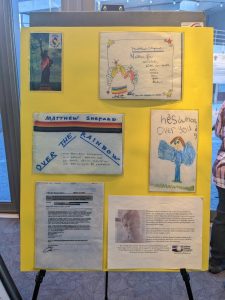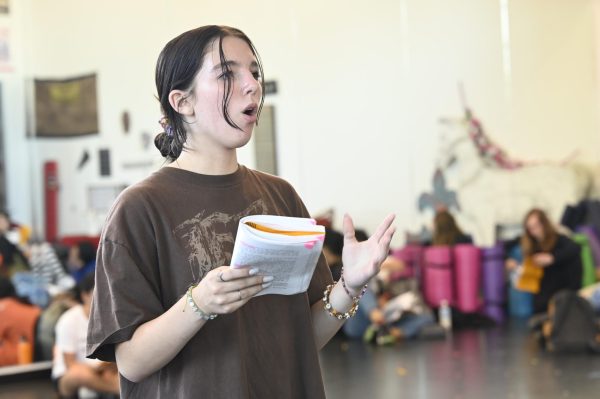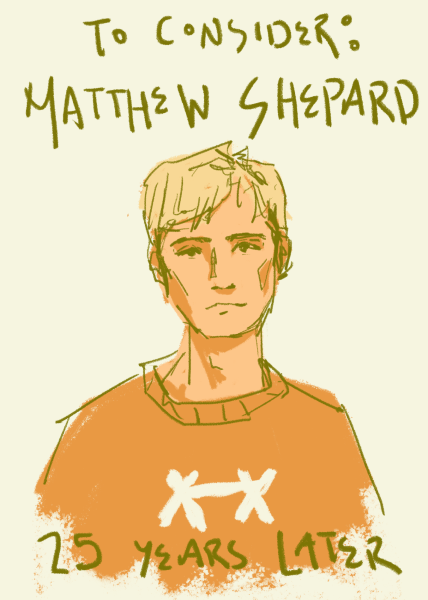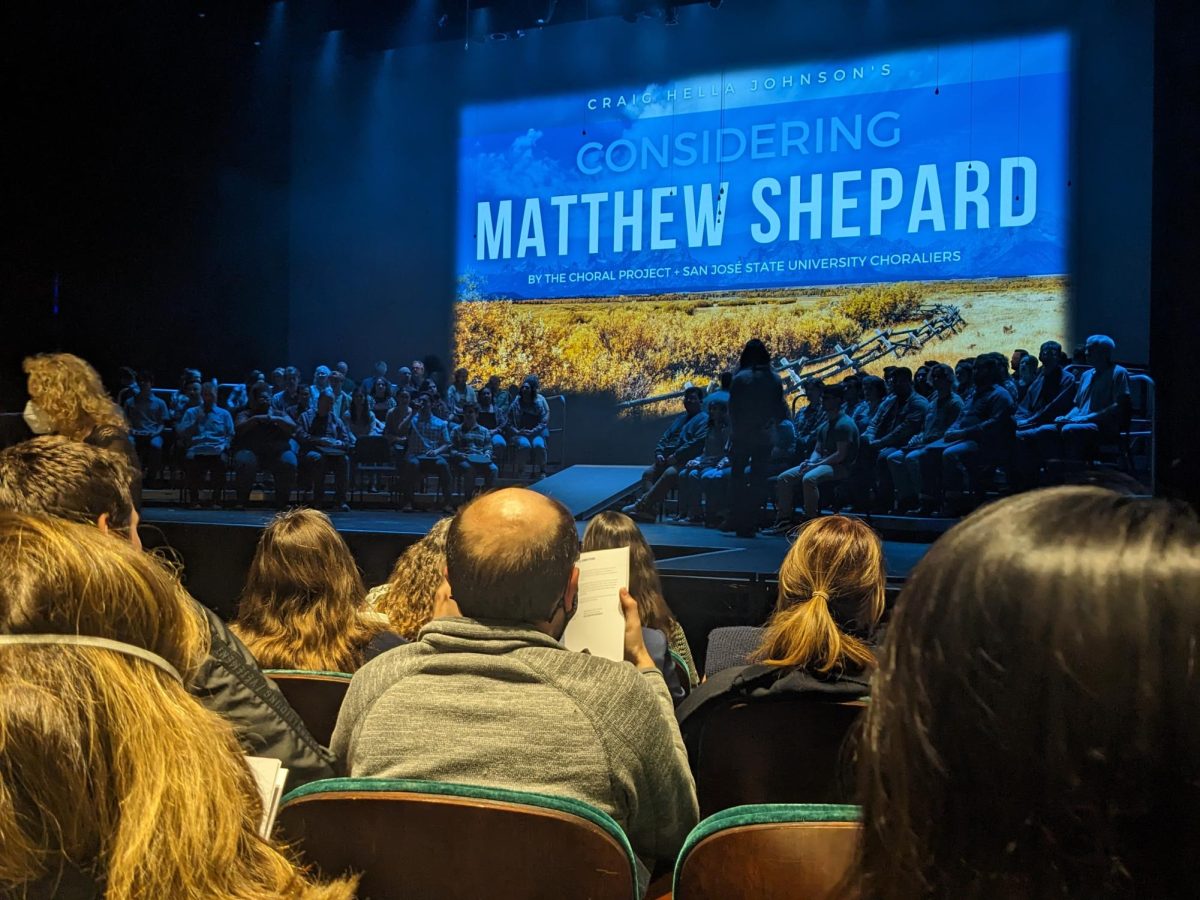Trigger warning: This article includes discussion about assault and death. We advise readers who may be sensitive about these topics to reconsider reading this piece.
25 years ago, Matthew Shepard died. On the night of Oct. 7, 1998, Aaron McKinney and Russell Henderson tied him to a fence, beat him with a pistol and left the gay 21 year-old University of Wyoming student for dead. His death and the subsequent trial of his assailants sparked a nationwide conversation about hate, intolerance and the need for empathy in the face of violence.
His murder polarized the nation. Alongside uproar, both demanding change and reinforcing hate, also came a wave of books, documentaries, plays and albums commemorating Shepard. Two of those compositions recently made their way to the Bay Area: Craig Johnson’s album “Considering Matthew Shepard” and Moisés Kaufman and the Tectonic Theatre Project’s “The Laramie Project.” The Choral Project and the San José State University Choraliers collaborated to perform the former on April 14 and 15. The Harker Conservatory will produce the latter for the fall play from Oct. 26 to 28.

Regarding Shepard’s death, cemented as one of the most infamous American hate crimes, it is impossible to use the distance of time to bandage a national wound. Rather, both ensemble elegies offer closure via investigation and understanding.
Despite the notoriety of his murder, Shepard was an otherwise normal university student. In him lies tragic loss, but also a relatability. The idea that “any of us could be him” is harrowing but integral to his death’s impact. “Considering Matthew Shepard” stage director Amy Young found solidarity and comfort in conversations with Shepard’s family and her choral peers.
“How do we find closure?” Young said. “How do we find forgiveness and understanding [in this violence]? One of the hardest parts of the story is having to confront our feelings about the perpetrators…The divine is present in all of us. You could be me, I could be you, and we really need to look out for each other with that in mind.”
Harker’s cast in “The Laramie Project” spoke with Shepard’s classmate Jedidiah Schultz in a virtual Q&A at the start of production. Schultz discussed his personal connection to the murder and hope for a future where youth do not have to continue reliving Shepard’s tragedy.

Upper school theater teacher and “The Laramie Project” director Brandi Griffith reflects on discussions with Schultz and the cast. Recent bans and cancellations of “The Laramie Project” productions nationwide were an elephant in the room.
“Our conversations don’t feel like closure,” Griffith said. “It actually feels like an opening, a launching point for those difficult conversations. The nuance and depth of them made us feel a responsibility to tell this story, to hold these words as prized possessions.”
Death isolated Shepard in a state of martyrdom. The national spotlight he rests in easily washes out the ordinary human in him. To reduce him to a tragic victim is to create distance between him and the present. Matthew Shepard must not be mischaracterized as a relic of the past, a target for “thoughts and prayers” only remembered when Oct. 12 comes around.

Members of the LGBTQ community still face the same dangers Shepard did across America. According to the American Civil Liberties Union (ACLU), a record 501 anti-LGBTQ bills have been introduced in 2023, largely targeting youth. In the past year, the Anti-Defamation League (ADL) and the Gay & Lesbian Alliance Against Defamation (GLAAD) found 356 cases of anti-LGBTQ harassment, vandalism and assault. The Choral Project artistic director and founder Daniel Hughes emphasizes “Considering Matthew Shepard”’s contextualization of Shepard’s death.
“We cover all the different aspects and perspectives of grief,” Hughes said. “How it spills out into the rest of the world. How the murderers were feeling in the moment. How it affects a community. Instead of just remembering Matthew, we need to consider everything that’s spun out from the orbit of the event.”Harker’s production of “The Laramie Project” will run from Oct. 26 to 28 at 7 p.m. The play, open to the public, will be held in the Patil Theater. Tickets can be purchased here.


















![“[Building nerf blasters] became this outlet of creativity for me that hasn't been matched by anything else. The process [of] making a build complete to your desire is such a painstakingly difficult process, but I've had to learn from [the skills needed from] soldering to proper painting. There's so many different options for everything, if you think about it, it exists. The best part is [that] if it doesn't exist, you can build it yourself," Ishaan Parate said.](https://harkeraquila.com/wp-content/uploads/2022/08/DSC_8149-900x604.jpg)




![“When I came into high school, I was ready to be a follower. But DECA was a game changer for me. It helped me overcome my fear of public speaking, and it's played such a major role in who I've become today. To be able to successfully lead a chapter of 150 students, an officer team and be one of the upperclassmen I once really admired is something I'm [really] proud of,” Anvitha Tummala ('21) said.](https://harkeraquila.com/wp-content/uploads/2021/07/Screen-Shot-2021-07-25-at-9.50.05-AM-900x594.png)







![“I think getting up in the morning and having a sense of purpose [is exciting]. I think without a certain amount of drive, life is kind of obsolete and mundane, and I think having that every single day is what makes each day unique and kind of makes life exciting,” Neymika Jain (12) said.](https://harkeraquila.com/wp-content/uploads/2017/06/Screen-Shot-2017-06-03-at-4.54.16-PM.png)








![“My slogan is ‘slow feet, don’t eat, and I’m hungry.’ You need to run fast to get where you are–you aren't going to get those championships if you aren't fast,” Angel Cervantes (12) said. “I want to do well in school on my tests and in track and win championships for my team. I live by that, [and] I can do that anywhere: in the classroom or on the field.”](https://harkeraquila.com/wp-content/uploads/2018/06/DSC5146-900x601.jpg)
![“[Volleyball has] taught me how to fall correctly, and another thing it taught is that you don’t have to be the best at something to be good at it. If you just hit the ball in a smart way, then it still scores points and you’re good at it. You could be a background player and still make a much bigger impact on the team than you would think,” Anya Gert (’20) said.](https://harkeraquila.com/wp-content/uploads/2020/06/AnnaGert_JinTuan_HoHPhotoEdited-600x900.jpeg)

![“I'm not nearly there yet, but [my confidence has] definitely been getting better since I was pretty shy and timid coming into Harker my freshman year. I know that there's a lot of people that are really confident in what they do, and I really admire them. Everyone's so driven and that has really pushed me to kind of try to find my own place in high school and be more confident,” Alyssa Huang (’20) said.](https://harkeraquila.com/wp-content/uploads/2020/06/AlyssaHuang_EmilyChen_HoHPhoto-900x749.jpeg)





